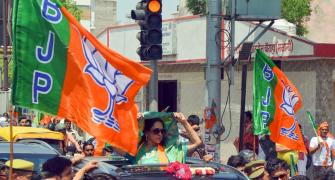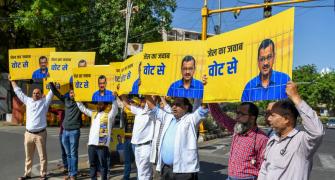According to intelligence and diplomatic sources in the United States, Francis J Aranha, an Indian Police Service officer who till June was counselor, personnel, at the Indian embassy in Washington, DC, may have been trying to return to the US to protect himself and his family from the wrath of Mumbai's gangsters.
Working with the Federal Bureau of Investigation and the FBI office in New Delhi during his tenure in Washington, DC, Aranha had pursued "a lot of the Mumbai underworld's connections and money-laundering activities in the US," one source told Rediff India Abroad.
Aranha, a 1984 batch IPS officer of the Maharashtra cadre with the rank of inspector general of police who worked for more than three years at the Indian embassy, "was also the driving force in providing the US authorities with information on Abu Salem," one of the accused in the March 12, 1993 bombings in Mumbai, who was living in Portugal at the time.
Aranha's efforts ultimately led to the US putting pressure on Lisbon for Salem's extradition to India, the source said.
Another source said Aranha had also provided information about Salem's links with another 1993 blasts accused, fugitive gangster Dawood Ibrahim, and his money-laundering activities in the US and Europe. This information led the FBI, working in concert with European agencies and the US Department of Treasury, to uncover many of these transactions, ultimately leading to the US designating Ibrahim a terrorist under laws covering racketeering and the trafficking of narcotics.
The sources said the Mumbai underworld knew about Aranha's contribution to the case against Salem because he was not working undercover as many officers of the Research and Analysis Wing, India's external intelligence agency, do when they are posted abroad. It was well known that he worked for India's Intelligence Bureau despite his official designation as counselor.
In the 1980s and early 1990s, one source said, senior IPS officers were posted as counselors or ministers at the Indian embassy in Washington, DC, to keep tabs on the separatist Khalistan movement, then active in the US.
These people "would monitor their (Khalistani) activities in cooperation with the FBI. A special cell was created in the US State Department's South Asia bureau to keep tabs on Khalistani elements, their movements, their fundraisers, attempts to procure and ship weapons, etc," one source said.
The sources felt the Mumbai underworld may have planned to kill Aranha on his return to India.
Reports from India said Aranha stunned his colleagues when he sought retirement immediately after
These reports said the Indian government issued a red alert at all international airports, leading to his arrest. One report claimed, 'What was most shocking for the government was that his passport had an IMF work permit stamped on it.'
Geeta Bhatt, an IMF spokesperson who deals with the India portfolio at the multilateral organisation, refused to either confirm or deny whether Aranha had been offered a job. "This is more between this gentleman and the Indian police," she told Rediff India Abroad.
"We cannot say anything now," was all she would say when pushed for a response whether the IMF had hired Aranha without checking with the Indian government if he had indeed been released from the IPS and his early retirement sanctioned so he could apply for another position. "We are neither conforming or denying (the claim). Right now, we can't say anything. I don't have anything to offer you."
She scoffed at the report that Aranha's passport had an 'IMF work permit stamped on it,' saying, "there can be no case of an IMF work permit -- there is no thing as an IMF work permit stamped on a passport. So I don't know what it is. Either they give you a G-4 visa. But, as I said, I am not aware of anything."
Meanwhile, another informed source dismissed the belief that Aranha was trying to protect himself from the Mumbai underworld's wrath, saying, "C'mon yaar, there are so many guys who get posted here (in Washington, DC and other parts of the US) who organise jobs for themselves and their wives before their return and then quit their jobs and get back."
This source noted that the children in such families have adapted themselves to life in the US "and they have gotten used to a certain standard of living."
Another source speculated that the problem could be that the Indian government was annoyed that after finishing a top posting in Washington, DC, Aranha had tried to return, taking premature retirement.
"The expectation is that after a plum assignment you will come back and do a hardship posting. Then, after retirement, you can go wherever the hell you please," the source said, adding that it may have had more to do with perceived subversion of procedure.
The government was getting tired of putting people in prime positions and then having them find more lucrative jobs and then walking out on the bureaucracy, the source said. "Maybe, they wanted to make an example out of him," the source felt.
A mid-level security position at the IMF would pay anywhere from $35,000 to $50,000 per annum, depending on experience. These earnings are not taxed and the perks include free travel home once a year for the employee and her/his family.








